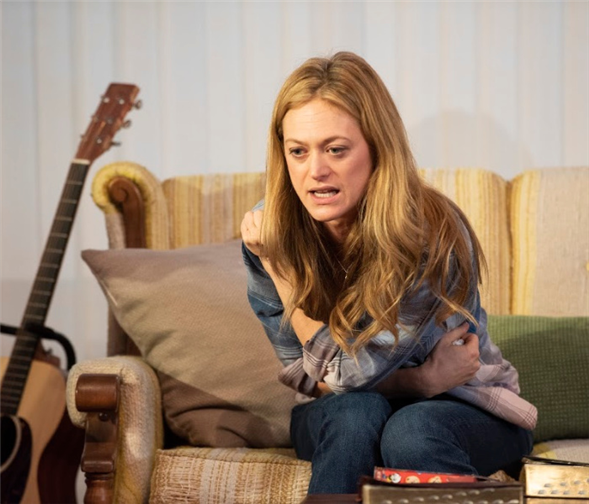Translate Page

Marin Ireland is all fired up in Abby Rosebrock's Blue Ridge
---
In 2015, Abby Rosebrock's mentor said he was worried about her due to "all this plasma hot rage" in the new play she was writing. Her initial reaction was dismissive. He's a man, she thought. He should appreciate what I'm doing and learn from it. But his assessment of her frame of mind gnawed at her.
"I didn't realize how 'plasma hot' those emotions were in my script," she recalls. "I hadn't reckoned with what it meant to put those feelings out in the universe through my writing."
Her now-finished world-premiere play, Blue Ridge at the Atlantic Theater Company, is a product of that still-ongoing reckoning. Directed by Obie winner Taibi Magar, the pitch-black comedy focuses on Alison, a disgraced southern Appalachia teacher whose act of anger against a man lands her in a halfway house. While Rosebrock admits Alison isn't her first pissed-off female protagonist, she's approaching the character from a fresh point of view.
"I had written a lot about angry women in previous plays from a place that sort of celebrated or made comedy out of the emotions they were dealing with," Rosebrock says. But her mentor's feedback coupled with watching apoplectic supporters of Donald Trump on the news inspired the dramatist to reflect on her own unresolved pain and anger. With Blue Ridge, she's "trying to exorcise demons, exploring the mind of someone who is truly stuck in a very dangerous and volatile place."
Marin Ireland plays Alison with biting humor and frenetic energy. She's a combustive contradiction: coquettish one minute, combative the next, aiding her fellow halfway house residents while attacking the pastor who tends to them. Even though Rosebrock started writing the script before #MeToo swept the country, Ireland thinks Blue Ridge examines how we got here.
{Image1}
"I feel like this woman is experiencing the bigger current of something we all have access to at this time," Ireland says. "And I think part of the incredible thing about the character is she isn't our hero, she's not always likable and she's sometimes hard to watch. But there are moments when it's really cathartic to hear somebody shout [the things she's saying] out loud."
Looking at Ireland's stage résumé, it's clear she relishes playing complicated, not always agreeable characters. She received a Tony nomination for her profanity-filled performance in reasons to be pretty, and earned raves as a hard-bitten Polish immigrant in Ironbound and a gun-obsessed professor in On the Exhale, to name a handful. But, in some ways, Alison's issues seem to hit closer to home for Ireland. In 2015, the performer talked to The New York Times about a romance with a fellow actor that went wrong, which helped jump-start a much-needed conversation about sexual harassment in the theatre industry. Then about a year ago, Ireland and the lawyer Norman Siegel announced a mediation program for artists who feel they've been victimized in the workplace.
Despite her activism, Ireland doesn't "want to be the spokesperson for something in particular," though she's available to support those who seek her assistance. "It is a way in which Alison and I seem similar in wanting to speak up for people," she says.
And while audiences may think Alison and Blue Ridge are tailor-made for this moment, Ireland stresses that the play's themes are timeless. "Female rage has long been a thing, it just wasn't written about in the same capital letters kind of way," she says. "Before this stuff became mobilized as a sort of call to arms, it was still there."
Rosebrock concurs. "I had people label other stuff that I'd written before #MeToo as #MeToo plays," she says. "That's not a complaint. But it was really surreal and scary to feel I had drafted this thing that was going to be participating in these very painful and charged broader conversations because the play is so personal. All I can say is that I hope it contributes to conversations that ultimately are healing for folks."
To read about a student's experience at Blue Ridge, check out this post on TDF's sister site SEEN.
---
TDF MEMBERS: At press time, discount tickets were available for Blue Ridge. Go here to browse our current offers.
Carey Purcell writes about pop culture and politics for Vanity Fair, Politico, and other publications, and blogs at CareyPurcell.com.
Top image: Marin Ireland in Blue Ridge. Photos by Ahron R. Foster.